Round tables brought together participants from around the world to discuss how we can better integrate diversity and multiculturalism into research and practice in our urban forestry work.
In Canada, we typically see that the curation and maintenance of urban forests is the responsibility of municipalities. Communities often seek direction from peers as well as look to provincial and federal level support. Tree Canada offers opportunities for communities to get involved through tree planting events, urban greening initiatives and grants, networking, and engagement. The outcomes of initiatives conducted within the Engagement and Research pillar strengthen overall leadership in urban forestry at the national scale and bridge communication across communities to foster collaboration and encourage diversity.
First, with respect to the Canadian Urban Forest Network (CUFN), the list membership rose from 450 individuals (between 2004-2014) to 925 members (between 2015-2017), more than doubling within the past two years. The CUFN was created to bring people together to share their stories and ideas, ask questions and learn from one another, and in some cases contest the status quo and grow. In light of recent threats to urban trees, we have seen more activity on the list with individuals vocalizing their concerns and offering support by sharing successes to overcome challenges. To this end, several recent achievements of the CUFN program include:
- Conducting the CUFN member survey to capture demographic profiles of list members and to better understand participant interests (Bardekjian & Chiriac, 2018). These survey results will help guide the CUFN Steering Committee’s efforts to engage the regions in the months to come.
- Facilitating the development of urban forestry action plans for each of Canada’s five regions in collaboration with the CUFN Steering Committee regional representatives, including hosting local workshops (e.g., Pacific region: October 2017; Ontario region: October 2017; Atlantic region: November 2017; Prairies region: March 2018). The goal for the action plans is to strategically guide the regions according to their needs.
- Launching the Canadian Urban Forestry Awards (2018) to recognize individuals and groups who have significantly contributed to the advancement of Canadian urban forestry. Winners for the inaugural year will be announced at the 2018 International Urban Forestry Congress.
- Sharing knowledge by coordinating and delivering webinars and e-lectures in partnership with the Canadian Institute of Forestry on a variety of topics (e.g., best practices, planning, resiliency) as well as organizing speaker series and panel discussions at the Federation of Canadian Municipalities conferences (June 2017; February 2018). Collectively, we had over 300 participants tuning in nationwide. In addition, the FCM allows us to profile urban forestry efforts and needs to a captive audience of decision makers.
- Raising awareness about urban forestry issues at various conventions and events (in excess of 30 between 2014-2017) such as attending the Canadian Forest Service Science-Policy Workshop (September 2017) to discuss integrating urban forests into their 10-year Research Strategy, as well as attempting to set the Guinness World Record for the Longest Tree Hug on National Tree Day (September 2014). The outcomes of these various avenues of engagement have increased public interest in urban forestry as well membership in the CUFN.
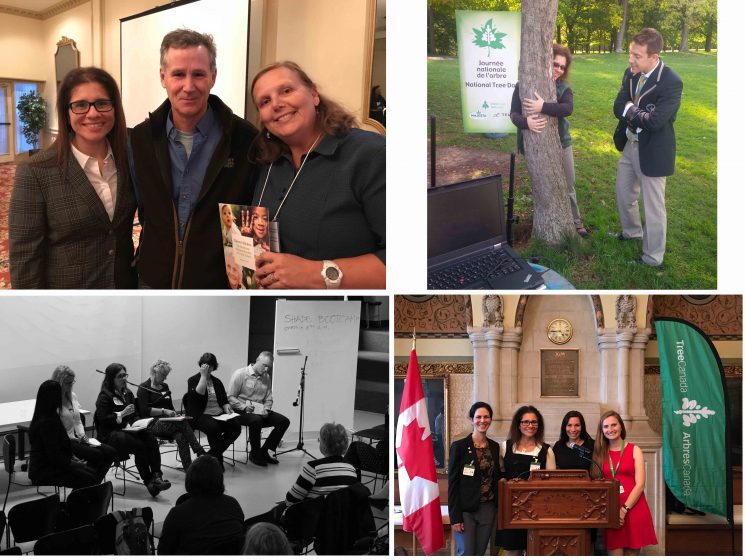 Second, the Canadian Urban Forest Strategy (CUFS) offers guiding principles for urban forestry at the national level. In recent years, more and more Canadian municipalities have been developing urban forest management plans and tree protection policies. Feedback from stakeholders and members has evidenced the need for a national strategy supported by all levels of government; as the Secretariat for the CUFS, Tree Canada promotes its importance to municipal, provincial and federal levels. In collaboration with multiple and diverse partners, several recent achievements include:
Second, the Canadian Urban Forest Strategy (CUFS) offers guiding principles for urban forestry at the national level. In recent years, more and more Canadian municipalities have been developing urban forest management plans and tree protection policies. Feedback from stakeholders and members has evidenced the need for a national strategy supported by all levels of government; as the Secretariat for the CUFS, Tree Canada promotes its importance to municipal, provincial and federal levels. In collaboration with multiple and diverse partners, several recent achievements include:
- Conducting the State of Canada’s Municipal Forests Survey (Bardekjian, Kenney, & Rosen, 2016). This study offers insights to municipal forestry practices, inventory systems, canopy cover, bylaws, budgets and social considerations.
- Guiding a national-scale municipal research needs assessment in collaboration with Laval University (Larouche, 2017). From 192 responses across 167 municipalities of 5,000 inhabitants or more, this study offers insights into cities urban forest management structures, expectations and research needs in applied and social contexts;
- Mapping Canada’s Urban Forestry Footprint in collaboration with the University of Toronto with support from Mitacs (Yung et al., 2018). This study profiles and maps the communities across Canada that have urban forestry departments, management plans, and tree protection bylaws;
- Contributing to a labour market research project with the Career Foundation, International Society of Arboriculture Ontario Chapter, Ontario Commercial Arborists Association, and industry partners to identify the barriers and issues that prevent people from pursuing employment opportunities in the field of arboriculture (2017-2018). This study aims to increase recruitment;
- Contributing to the development of an urban forestry carbon protocol supported by Environment Canada and multiple academic partners (2017-2018). This study generated the first national database of urban forest inventories from 181 municipalities across Canada and contends that a standardized national urban forest inventory and monitoring approach will support a better understanding of urban forest carbon dynamics and enable policy and management improvements;
- Contributing to a literature review of peer-reviewed articles on the benefits of urban forests for public health led by Health Canada’s Climate Change and Innovation Bureau and the University of Washington (Wolf et al., 2018). This study is the first systematic review to focus on urban trees (rather than broader greenspaces, corridors and parks) as a beneficial source for human health and wellbeing;
- Examining the needs of Indigenous communities with respect to urban greening projects in collaboration with the Canadian Forest Service by analyzing past Tree Canada grant recipients (Gosselin-Hebert et al., 2018). This study seeks more inclusive ways to better integrate Indigenous perspectives and knowledge into program practices;
- Collaborating with various academic institutions to integrate and advance urban forestry education in higher learning. This includes contributing to the University of British Columbia’s Bachelor of Urban Forestry program and collaborating on an application to develop a professional training program with multiple academic partners led by l’Université du Québec à Montréal (UQAM) (2017-2018).
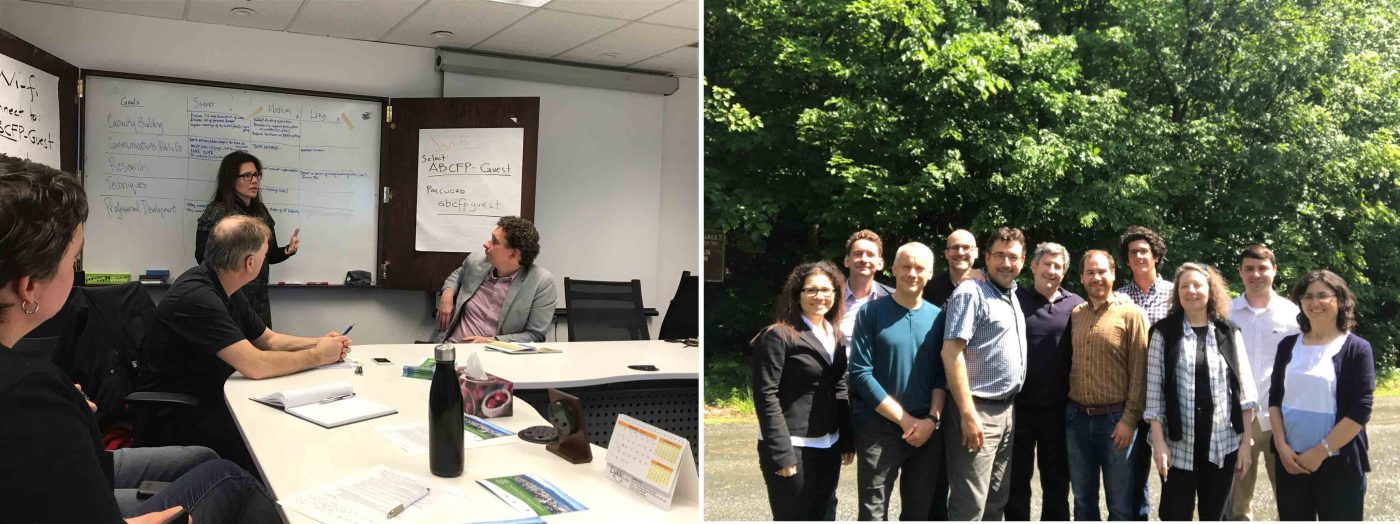 The CUFN Steering Committee, along with a secondary review committee consisting of provincial and federal government representatives, is currently in the process of updating the Canadian Urban Forest Strategy for the 2019-2024 term. This process began with public consultation workshops in autumn of 2015 in each region and has been ongoing for the past two years. The objective of the workshops was to ensure that regional voices were heard in the strategy’s redesign. The new version of the CUFS (2019-2024) will be presented at the 2018 International Urban Forestry Congress in October in Vancouver, BC. With respect to national efforts, there are three recent initiatives in the United States that are relevant and helpful to Canada’s efforts in urban forestry:
The CUFN Steering Committee, along with a secondary review committee consisting of provincial and federal government representatives, is currently in the process of updating the Canadian Urban Forest Strategy for the 2019-2024 term. This process began with public consultation workshops in autumn of 2015 in each region and has been ongoing for the past two years. The objective of the workshops was to ensure that regional voices were heard in the strategy’s redesign. The new version of the CUFS (2019-2024) will be presented at the 2018 International Urban Forestry Congress in October in Vancouver, BC. With respect to national efforts, there are three recent initiatives in the United States that are relevant and helpful to Canada’s efforts in urban forestry:
- The Ten-Year Urban Forestry Action Plan (2016-2026) for the National Urban and Community Forestry Advisory Council and the Community of Practice, offering goals, actions, and recommendations for cultivating urban forestry across the country.
- An impact assessment of the USDA Forest Service National Urban and Community Forestry Grant Program, completed by Southern Regional Extension Forestry (SREF), found that funding for projects and research has reached millions of people across the United States.
- The creation of “Vibrant Cities Lab” by the US Forest Service, American Forests, the National Association of Regional Councils, and others, to help city managers, policymakers, and advocates build prosperous urban forestry programs.
For a detailed overview of the above three programs, see Michelle Sutton’s article in the March/April 2018 issue of City Trees, a publication of the Society of Municipal Arborists.
Lastly, since 2014, in my role with Tree Canada, I have collaborated with several communities to coordinate three Canadian Urban Forest Conferences (City of Victoria, BC: 2014; City of Laval, QC, 2016; City of Vancouver, BC: 2018). The objective of the CUFC is to bring together the network of national and international urban forestry professionals, practitioners, researchers, students, and community groups to share knowledge and foster collaboration. In my experience working with communities on these events, the level of dedication and commitment shown by the individuals who work tirelessly to bring
participants together to create a learning commons inspires me. The next Canadian Urban Forest Conference will be held in conjunction with two other conferences that comprise the 2018 International Urban Forestry Congress. This event is being organized in collaboration with multiple partners: Tree Canada, City of Vancouver, Pacific Northwest Chapter of the ISA, City of Surrey, and the University of British Columbia. The theme of the conference is Diversity.
The Engagement and Research portfolio of programs moves beyond tree planting by recognizing, empowering and bringing together the people who work in urban forestry, and more broadly urban greening stewardship, across Canada. Moving forward in 2018, selected goals of this portfolio include:
- Updating the Compendium of Best Management Practices for Canadian Urban Forests;
- Building closer partnerships with academic institutions to encourage departments to include urban forestry within their curriculum; and
- Contributing to the delivery of a successful International Urban Forestry Congress.
On a personal note, I recently took part in two activities that better informed my perspective on our collective urban forestry efforts in Canada—regarding how we share knowledge and foster cross-cultural collaboration.
Last summer I was invited by the US Forest Service International Programs to represent Canada in their inaugural International Urban Forestry Seminar, with 19 participants from 16 countries worldwide (Chicago & New York; June 4-17, 2017). The two-week seminar enhanced and expanded my views on international activities in urban forestry by sharing insights and learning with others. Our group dealt with a series of themes including youth engagement, collaborating with non-traditional partners, resiliency (both social and ecological) and food security (Bardekjian & Paqueo, 2018). The idea of collaborating with non-traditional partners with the specific objective to integrate diversity and multiculturalism into urban forestry practice is not as actively practiced in Canada. My main takeaway from this experience was to “look more closely, and think more deeply” (Bardekjian, 2017) about the way we do things and I have since integrated many of these lessons into my research and work with various organizations and initiatives.
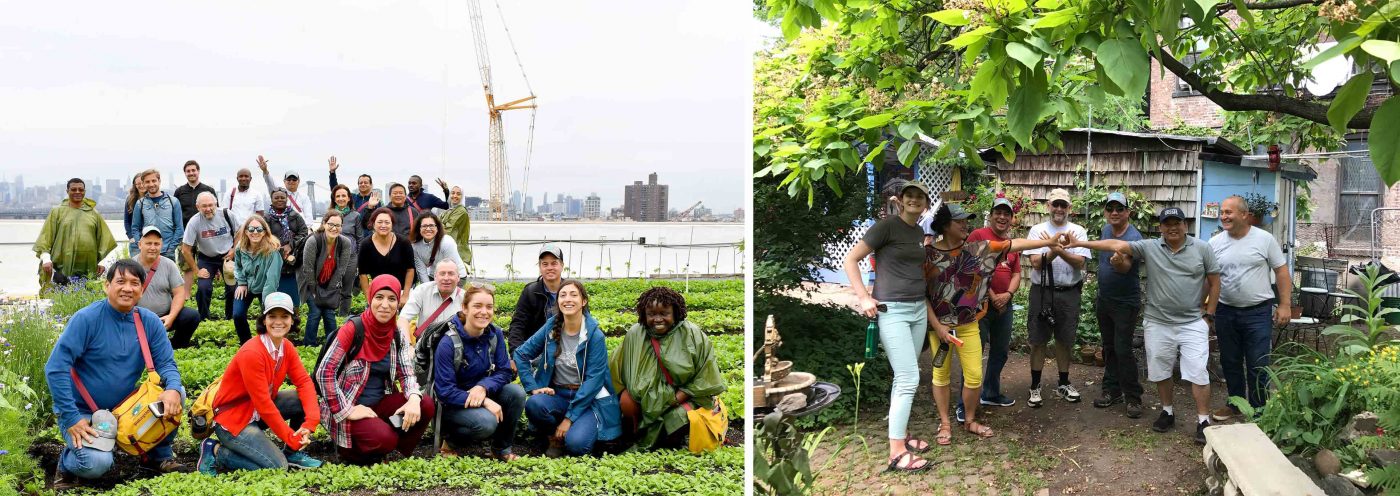 The second experience I want to share that demonstrated collaborative learning was participating in the Peter Wall Institute for Advanced Studies International Roundtable (October 23-25, 2017) called, “Do Rainbows Come in Green: Urban Forests and Multicultural Citizenship” organized by my mentor and academic supervisor, Dr. Cecil Konijnendijk van den Bosch, University of British Columbia. This three-day workshop explored the theme of diversity in urban forestry across disciplines from both theoretical and practical perspectives. The round table brought together participants from around the world to discuss how we can better integrate diversity and multiculturalism into research and practice in our urban forestry work. As part of this workshop, I had the opportunity to represent a Canadian perspective on a panel of international speakers with leading global experts from Finland, the UK, and the Netherlands, and co-curate a digital photo exhibit, titled, Human Faces, Forest Places (Nesbitt & Bardekjian, 2017), profiling the diversity in people and their experiences with urban trees. During this same week, the CUFN Pacific region held their fall workshop focusing on topics including climate change adaptation, shade tree management, and biodiversity strategies.
The second experience I want to share that demonstrated collaborative learning was participating in the Peter Wall Institute for Advanced Studies International Roundtable (October 23-25, 2017) called, “Do Rainbows Come in Green: Urban Forests and Multicultural Citizenship” organized by my mentor and academic supervisor, Dr. Cecil Konijnendijk van den Bosch, University of British Columbia. This three-day workshop explored the theme of diversity in urban forestry across disciplines from both theoretical and practical perspectives. The round table brought together participants from around the world to discuss how we can better integrate diversity and multiculturalism into research and practice in our urban forestry work. As part of this workshop, I had the opportunity to represent a Canadian perspective on a panel of international speakers with leading global experts from Finland, the UK, and the Netherlands, and co-curate a digital photo exhibit, titled, Human Faces, Forest Places (Nesbitt & Bardekjian, 2017), profiling the diversity in people and their experiences with urban trees. During this same week, the CUFN Pacific region held their fall workshop focusing on topics including climate change adaptation, shade tree management, and biodiversity strategies.
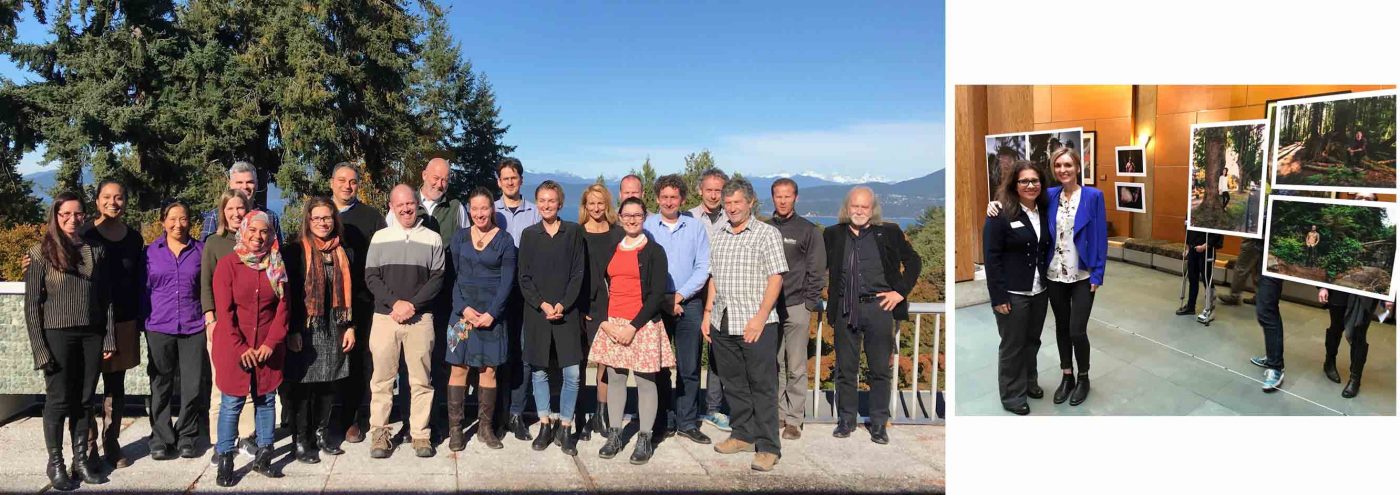 As a social scientist, and through my role with Tree Canada, and as a Postdoctoral Research Fellow with the University of British Columbia examining gender equity in arboriculture and urban forestry, I am proud to be contributing to urban forestry interests in Canada, and I look forward to seeing how our field evolves in the coming years. There is more to be done on various scales and ample opportunity for growth and collaboration. I encourage readers to use the CUFN listserv as a tool for sharing stories, projects, successes, and challenges—ask questions and inspire others… and if you are not a member, consider joining the conversation – there is no cost. In the coming months, I will be working with the CUFN Steering Committee Representatives to share regional updates from across Canada.
As a social scientist, and through my role with Tree Canada, and as a Postdoctoral Research Fellow with the University of British Columbia examining gender equity in arboriculture and urban forestry, I am proud to be contributing to urban forestry interests in Canada, and I look forward to seeing how our field evolves in the coming years. There is more to be done on various scales and ample opportunity for growth and collaboration. I encourage readers to use the CUFN listserv as a tool for sharing stories, projects, successes, and challenges—ask questions and inspire others… and if you are not a member, consider joining the conversation – there is no cost. In the coming months, I will be working with the CUFN Steering Committee Representatives to share regional updates from across Canada.
Best wishes for a productive year ahead!
Adrina C. Bardekjian
Montréal
References:
Bardekjian, A. & Paqueo, L. (2018). Beyond Trees: Growing international stewards in non-traditional ways. In Green Readiness, Response, and Recovery: A Collaborative Synthesis. New York, NY: US Forest Service [in press]
Bardekjian, A. & Chiriac, G. (2018). Interests and expectations: Results of the Canadian Urban Forest Network member survey. Tree Canada: Ottawa, ON.
Bardekjian, A. (2017). Look More Closely, Think More Deeply: Experiences from the 2017 US Forest Service International Urban Forestry Seminar. The Nature of Cities; July 23, 2017.
Bardekjian, A., Kenney, A., & Rosen, M. (2016). Trends in Canada’s Urban Forests. Tree Canada.
Gosselin-Hebert, A., Bardekjian, A., Quann, S., & Crossman, V. (2018). Urban forestry in Indigenous communities across Canada: Exploring the impact of greening initiatives. [forthcoming]
Larouche, J. (2017). Research needs in urban forestry in Canada. Unpublished master’s thesis, Laval University, Quebec, QC.
Nesbitt, L. & Bardekjian, A. (2017, October 23). Human Faces, Forest Places. Photography exhibit curated and presented at the Peter Wall Institute for Advance Studies Round Table: Do Rainbows Come in Green? Urban Forests and Multicultural Citizenship. Vancouver, BC.
Sutton, M. (2018). Zooming Out and In on Urban Forestry in the U.S. City Trees: Journal of the Society of Municipal Arborists. March/April issue. Champaign, IL.
Wolf, K., Lam, S., McKeen, J., Richardson, G., van den Bosch, M., & Bardekjian, A. (2018). City Trees & Public Health: Diverse Benefits, Diverse Beneficiaries. [forthcoming]
Yung, Y., Puric-Mladenovic, D., Bardekjian, A., & Wynnyczuk, P. (2018). Canada’s Urban Forestry Footprint: Mapping the extent and intensity of urban forestry activities. (2018). Available at: http://forestry.utoronto.ca/canadas-urban-forestry-footprint/

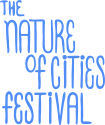
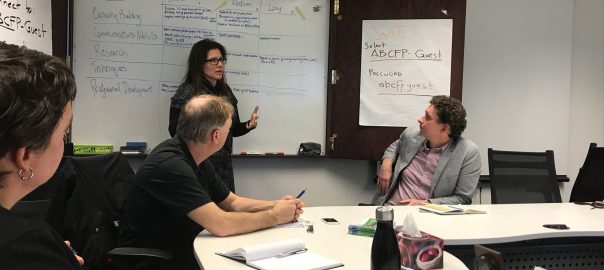
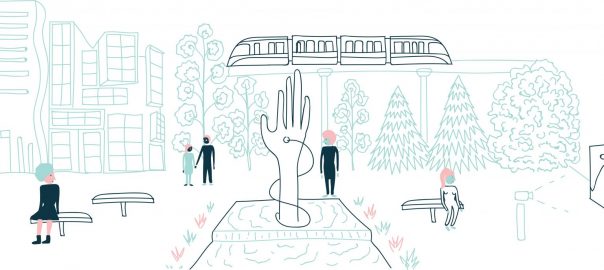
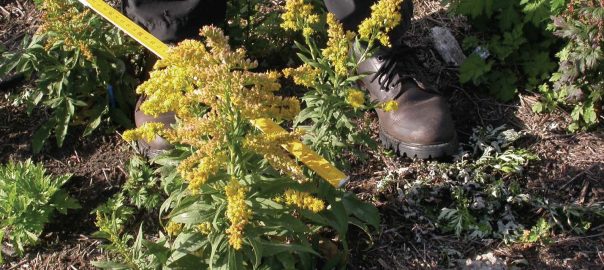
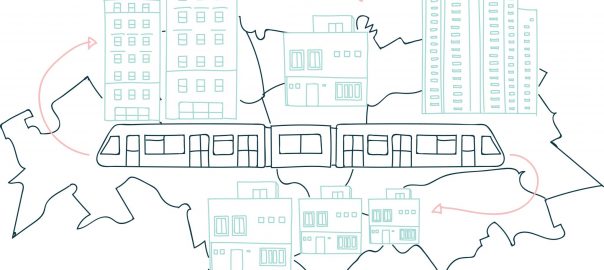
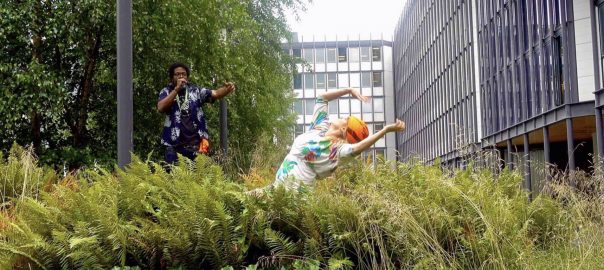
Leave a Reply